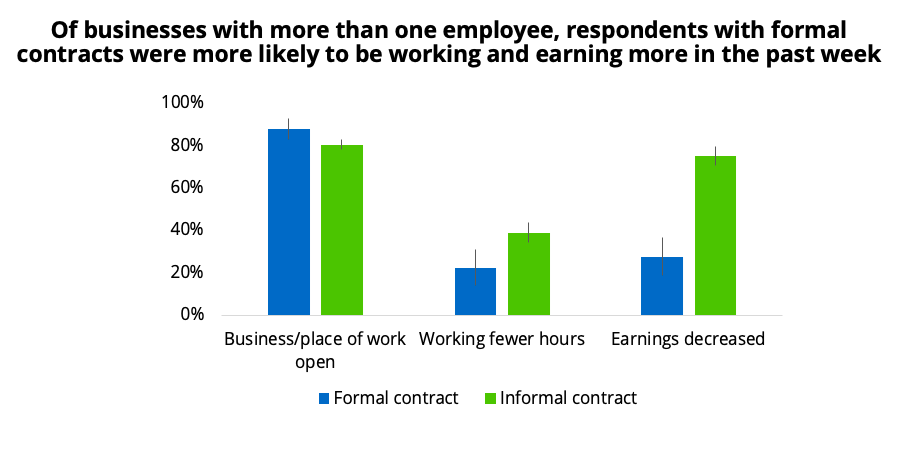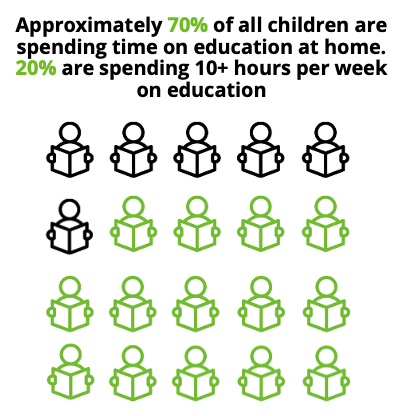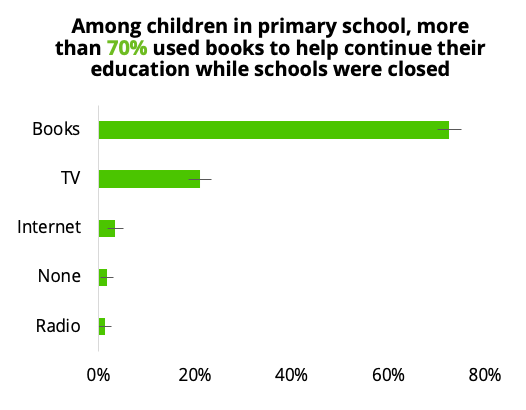The Economic Impacts of COVID-19 in Côte d’Ivoire: Lessons from the RECOVR Survey
By Luciana Debenedetti, Shahana Hirji, Samuel Kembou Nzale, Cyrille Gnalega, and Ben Anderson Koffi
Despite Côte d’Ivoire’s initial success in maintaining a relatively flat case count, COVID-19 cases have quintupled over the last two months, mostly in the Greater Abidjan area. Côte d’Ivoire is also in the middle of its rainy season and landslides and floods are affecting areas that were already exposed to COVID-19, further intensifying the crisis. These twin weather and health challenges stand to further imperil economic recovery efforts, for which policymakers need timely and comprehensive data to craft a comprehensive response.
We have worked with our key partners in the Ministries of Employment and Social Protection, the International Labor Organization, and the Ministry of Education to ensure that the survey provides useful information for policymakers addressing citizens' needs across the labor and education fields, in particular. In this blog post, we report key findings and policy takeaways.1
A majority of respondents do not feel at risk of contracting COVID-19 and are following preventative measures.
Only 41 percent of respondents said they personally felt at risk of contracting COVID-19. Almost all say that it is because they are following the recommended preventative measures—and indeed, 89 percent report wearing a mask in public. 14 percent of respondents said they had to delay or skip a routine health appointment, with a majority of respondents citing costs (rather than virus concerns) as the reason. Asked what worries them most about the crisis, a lack of money and health are the top factors for Ivorians.
Many respondents are out of work, and respondents in Côte d’Ivoire experienced a particularly steep drop in employment.
Nearly half of the survey sample have lost employment since February: while 67 percent reported that they worked in February, 20% of those employed in February say their businesses are now closed. Of businesses with more than one employee, 65 percent of respondents were earning less, and 35 percent saw their hours decline. Across most measures, workers with formal contracts in Côte d’Ivoire were doing better than informal workers. The UNDP released a report on the impact of COVID-19 on the informal sector in Côte d’Ivoire in May, with recommendations including establishing a support fund specifically for informal businesses affected by the crisis and providing support for food production.

Many respondents are experiencing food insecurity.
In Côte d’Ivoire, economic challenges seem to be leading to widespread food insecurity: over 70 percent of respondents reported that they had depleted savings in order to continue buying food, 61 percent reported that drops in income had prevented them from buying their usual amount, and over 40 percent reported lowering their portion sizes or reducing the number of meals they eat. This situation is likely to worsen with the seasonal peaks of malnutrition and malaria.
Spending time on education during the lockdown
Côte d’Ivoire’s schools began to reopen shortly before this survey began after being closed from March 16 to May 25. While schools were closed, about 70 percent of children spent time on education at home, and the vast majority of these students used books to continue studying. About 20 percent spent over 10 hours a week (or over 2 hours a day) on education, while a majority also spent time helping out with household chores. Wealthier households were more likely to report that children were continuing to spend time on education at home.


Policy Takeaways
In the coming weeks, we will continue discussing these findings and their policy implications with our partners and jointly determine which questions to include in the second round of the survey to inform decision-making. Priority policy questions include:
How can we ensure children experiencing food insecurity have access to food and health services?
The combination of a lengthy period of undernutrition, closed schools, and limited health care may be particularly damaging in the long run for children from poorer households who do not have alternative resources to make these critical human capital investments. In many places, a robust cash-based social safety net will be key to improving food security. In other places, market and business closures may call for direct food aid. Food ration programs focused on families with young children, or the reinstatement of school feeding or deworming programs before school instruction resumes, could help mitigate these adverse impacts.How can we support those that have most been economically affected by the pandemic, such as informal workers and their families?
Cash transfers have been effective across multiple contexts and boost food security and overall economic well-being for the poor. Mobile money could be one delivery method option, as the Western Africa Central Bank (BCEAO) is providing more flexible measures to open a mobile money account and making mobile money transfers free. Governments could consider the use of big data, leveraging previously collected national surveys, cell phone data, and satellite imaging to identify recipients. As closed businesses open back up and the self-employed resume work, it will also be important to ensure that financial access, both for emergency use and long-term investment, remains high enough to support new investments. The RECOVR surveys suggest people are missing payments and taking out risky loans to cope with unexpected expenses, and reducing the long-term negative impact on credit access will be critical.Parents’ and students’ commitment to keeping up with distance learning is an encouraging foundation for continued needed investments in education, particularly to address potential losses in learning outcomes.
Existing research about the effectiveness of teaching at the right level and an ongoing initiative evaluating the impact of text and audio messages can be used to inform long-term strategies by the Ministry of Education to strengthen student outcomes.
1. The Côte d’Ivoire RECOVR survey, conducted from June 6 to 26, reached 1,356 respondents, using a random sample from the Integrated Regional Survey on Employment and in the Informal Sector (ERI-ESI 2017).
Luciana Debenedetti is a Temporary Senior Policy & Communications Associate for IPA.
Shahana Hirji is a Policy Manager for IPA.
Samuel Kembou Nzale is the Research Manager and Country Representative for IPA Côte d'Ivoire.
Cyrille Gnalega is the Assistant Director of Research and Statistical Analysis for the Directorate General of Employment of Côte d'Ivoire's Ministry of Employment and Social Protection.
Ben Anderson Koffi is the Technical Advisor for the Directorate General of Employment of Côte d'Ivoire's Ministry of Employment and Social Protection.











